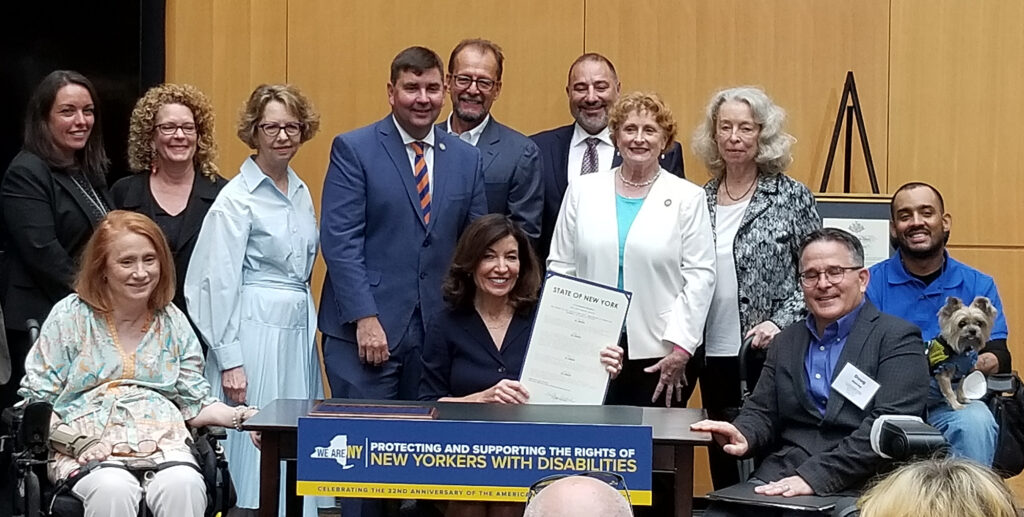New York’s New SDMA law
New York’s new SDMA law, technically, Article 82 of the Mental Hygiene Law, was signed by Governor Kathy Hochul on July 26, 2022, the anniversary of the Americans with Disabilities Act (ADA). The new SDMA law draws on SDMNY’s Principles for Supported Decision-Making Agreement Legislation, and accomplishes all three of SDMNY’s goals, and the goals of advocates across the country.

- It explicitly recognizes supported decision-making, both informal and with an SDMA, as a less restrictive alternative that courts should consider before imposing guardianship.
- It will prevent discrimination against people with I/DD by requiring third parties to accept decisions made by persons with SDMAs that have been entered into through a facilitation process set out in regulations to be drafted by the Office for People with Developmental Disabilities (OPWDD) within a year of the law’s signing. Those regulations are expected to closely mirror SDMNY’s facilitation process; it is also expected that SDMAs made with SDMNY prior to finalization of the regulations will be “grandparented”, that is, decisions made by Decision-makers with SDMNY SDMAs signed before July, 2023 will also have legislative recognition.
- It will incentivize parents to consider, and hopefully choose SDM as an alternative to guardianship because SDM is not some strange, new thing, but rather a process that the state legislature has overwhelmingly recognized. Additionally, it will ensure that a needed or desired service will not be denied in the future by a third party who could otherwise insist on guardianship.
The law has a number of other important features:
- It describes who may be a supporter, the kinds of support they can give, and the limitations on supporters’ authority. It makes clear that supporters cannot make decisions for the Decision-Maker, and that they have no independent legal status.
- It ensures that making an SDMA is voluntary and not coerced by prohibiting service providers from conditioning services on a person making an SDMA.
It is a ringing endorsement of the human right to make one’s own decisions, and the role that SDM can play in ensuring that right:
“The legislature finds that a person’s right to make their own decisions is critical to their autonomy and self-determination. People with intellectual, developmental, cognitive and psychosocial disabilities are often denied that right because of stigma and outdated beliefs about their capability. This right is denied, despite the reality that very few people make decisions entirely on their own. Everyone uses supports, as do people with disabilities; who may just need more or different kinds of supports…The legislature further finds that the, now well recognized, practice of supported decision-making is a way in which many people with disabilities can make their own decisions with the support they need from trusted persons in their lives…”
What the new law does NOT do
Unfortunately, there is considerable misinformation about the new law, and, in addition to understanding what it does do, it is also important to understand that it does not:
- Affect families’ and others’ ability to petition for guardianship if they so choose
- Require anyone to do supported decision-making or make an SDMA, including as a requirement for receiving services
- Prevent a Decision-Maker from seeking support outside the provisions of their SDMA, including from family members and others who may not be named as Supporters (though only decisions made pursuant to the terms of the SDMA will be legislatively recognized)
- Immediately “legalize” decisions made pursuant to SDMAs
- Extend legislative recognition to decisions made with SDMAs to groups other than persons with I/DD (older persons with cognitive decline; persons with psychosocial disabilities; persons with traumatic brain injuries [TBIs]); but encourages government and civil society to develop appropriate supports so that they may be covered by regulations in the future